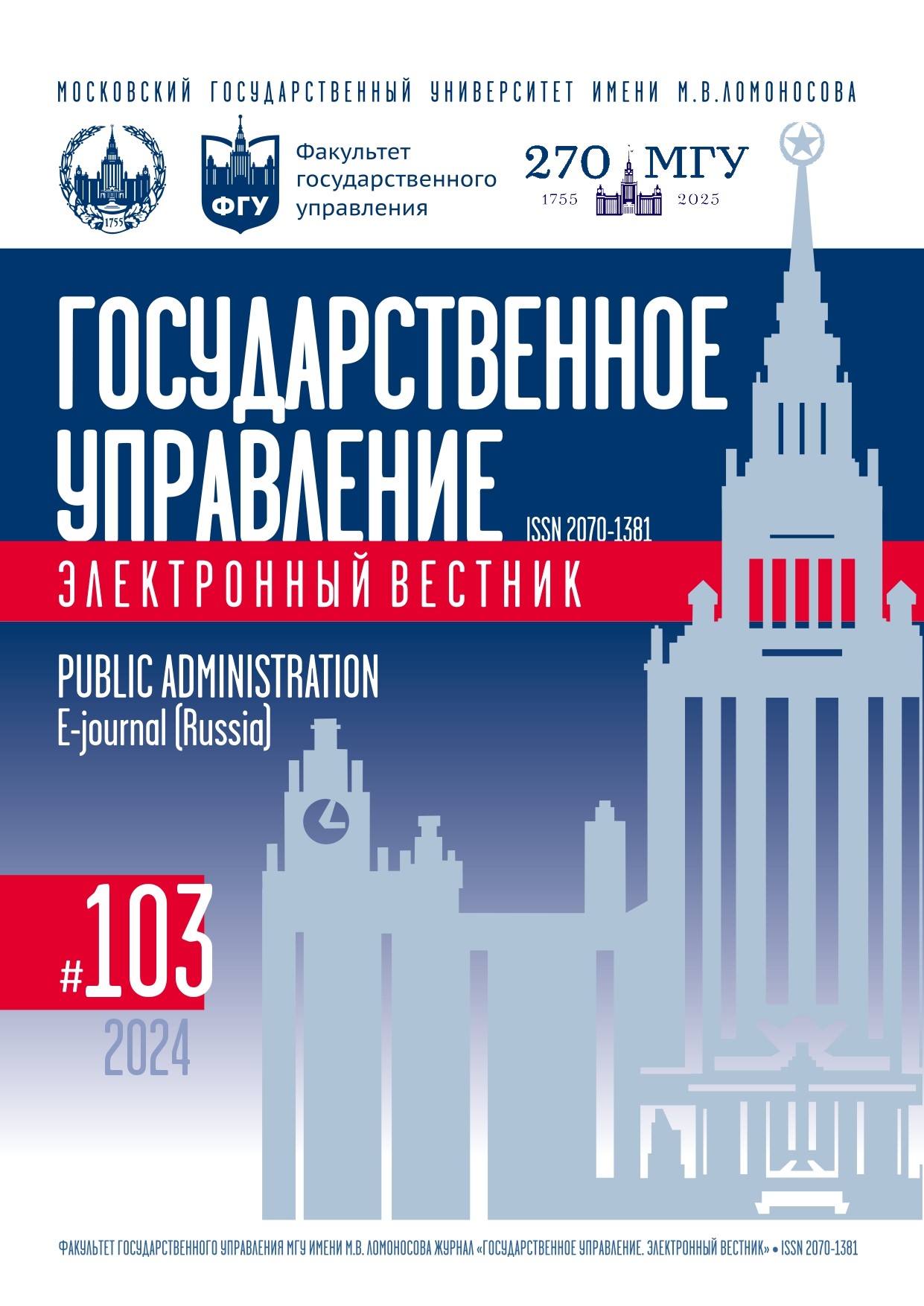A Complex of Management Tools to Overcome Differentiation of Region’s Spatial Development
Keywords:
Spatial development of regions, management tools, differentiation of spatial development, Siberian Federal District, Far Eastern Federal District.Abstract
A key direction of the state regional policy is sustainable socio-economic development of the regions of the Russian Federation. However, the solution of this issue is significantly complicated by a number of problems associated with the spatial heterogeneity of the country and further inequality in the level of socio-economic development of Russian regions. The relevance of this study is determined by the necessity to solve the problem of systematization of theoretical approaches to the description of mechanisms of socio-economic development of the subjects of the Russian Federation, aimed to overcome the spatial differentiation of territories by basic indicators. The object of the study is the regions of the Far Eastern and Siberian Federal Districts. The aim of the study is to develop the principles of systematization of tools for spatial development of the subjects of the Russian Federation depending on the level of differentiation of regions by basic principles. To achieve the aim, the authors used the following research methods: comparative analysis, empirical analysis, synthesis, statistical method, graphic research methods. Based on the comparative analysis of the existing causes of differentiation of spatial development of the subjects of the Siberian and Far Eastern Federal Districts, the objective and subjective factors of regional inequality were identified. The analysis of existing mechanisms of spatial development of the regions of the Siberian and Far Eastern Federal Districts revealed their insufficient efficiency in solving the problem of smoothing regional socio-economic inequality. The author’s approach to the formation of a set of management tools to overcome the differentiation of spatial development of regions on the example of the Siberian and Far Eastern Federal Districts on the basis of grouping the subjects according to the studied groups of basic indicators is proposed. The paper proposes the definition of individual characteristics of each subject of the Russian Federation as a basis for the formation of tools for spatial development of the region.
References
Архипова Л.С., Гагарина Г.Ю. Пространственная дифференциация регионов РФ и их конкурентоспособность // Вестник Удмуртского университета. Серия «Экономика и право». 2015. № 4. С. 22–27.
Булочников П.А., Смирнов К.Б. Межрегиональная дифференциация пространственного развития регионов Российской Федерации // Петербургский экономический журнал. 2019. № 4. С. 68–75. DOI: 10.25631/PEJ.2019.4.68.75
Бухвальд Е.М. Управление пространственным развитием российской экономики: цели и инструменты // Управленец. 2020. Т. 11. № 6. С. 2–14. DOI: 10.29141/2218-5003-2020-11-6-1
Воронов А.С. Пространственный подход в развитии социально-экономических систем регионов // Государственное управление. Электронный вестник. 2019. № 75. С. 249–267.
Домнина И.Н. Инструментарий пространственного стратегирования экономики: правовая база и практика применения // Экономика: вчера, сегодня, завтра. 2022. Т. 12. № 6А. С. 133–145. DOI: 10.34670/AR.2022.71.64.016
Журавлев Д.М. Экономический механизм управления развитием региона // Вестник Московского Университета. Сер. 21. Управление (государство и общество). 2020. № 1. С. 43–56.
Зубаревич Н.В. Стратегия пространственного развития: приоритеты и инструменты // Вопросы экономики. 2019. № 1. С. 135–145. DOI: 10.32609/0042-8736-2019-1-135-145
Ильин В.А., Ускова Т.В. Методы преодоления пространственной социально-экономической дифференциации // Федерализм. 2012. № 3(67). С. 7–18.
Клевцова М.Г., Положенцева Ю.С., Степанова А.Р. Институциональные инструменты преодоления дифференциации экономического пространства в условиях глобализации // Инновационная экономика: перспективы развития и совершенствования. 2018. № 8(34). С. 148–155.
Коваленко Е.Г., Полушкина Т.М., Якимова О.Ю., Акимова Ю.А. Инструменты преодоления внутреннего социально-экономического неравенства // Регионология. 2021. Т. 29. № 3. С. 611–641. DOI: 10.15507/2413-1407.116.029.202103.611-641
Копуш Д.-Х.М., Леонтьева Л.С. Актуальные тенденции пространственного развития регионов сибирского федерального округа // Государственное управление. Электронный вестник. 2022. № 95. С. 161–174. DOI: 10.24412/2070-1381-2022-95-161-174
Лактаева Н.Е., Купцова И.В. Перспективы использования концепции экономики счастья в оценке социально-экономического развития макрорегиона // Государственное управление. Электронный вестник. 2023. № 101. С. 120–133. DOI: 10.24412/2070-1381-2023-101-120-133
Леонтьева Л.С., Кудина М.В., Воронов А.С., Сергеев С.С. Формирование национального цифрового суверенитета в условиях дифференциации пространственного развития // Государственное управление. Электронный вестник. 2021. № 84. С. 277–299. DOI: 10.24412/2070-1381-2021-84-277-299
Молчанов И.Н. Страновое стратегическое планирование в контексте укрепления экономической безопасности // Вестник Московского Университета. Серия 21. Управление (государство и общество). 2023. № 2. С. 141–159. DOI: 10.55959/MSU2073-2643-21-2023-2-141-159
Насырова С.И. Экономика, ориентированная на человека: разработка дефиниции // Russian Journal of Economics and Law. 2022. № 2. С. 258–274. DOI: 10.21202/2782-2923.2022.2.258-274
Фомин М.В., Смирнов О.О. Устойчивость пространственного развития регионов Сибири и Дальнего Востока России // Вопросы государственного и муниципального управления. 2022. № 1. С. 124–147. DOI: 10.17323/1999-5431-2022-0-1-124-147
Швецов А.Н. Инструменты политики поляризованного пространственного развития // Федерализм. 2018. № 1. С. 82–103.
Liu Yi., Yigitcanlar T., Guaralda M., Degirmenci K., Liu A. Spatial Modelling of Urban Wind Characteristics: Review of Contributions to Sustainable Urban Development // Buildings. 2024. Vol. 14. Is. 3. DOI: 10.3390/buildings14030737
Matei G. Spatial Efficiency of Romaniaʼs Development Regions from the Perspective of Sustainable Development // Management of Sustainable Development. 2023. Vol. 15. Is. 2. P. 19–27. DOI: 10.54989/msd-2023-0013
Nurbatsin A., Kireyeva A., Gamidullaeva L., Abdykadyr T. Spatial Analysis and Technological Influences on Smart City Development in Kazakhstan // Journal of Infrastructure, Policy and Development. 2023. Vol. 8. Is. 2. DOI: 10.24294/jipd.v8i2.3012
Shang M., Zhang Sh., Yang Q. The Spatial Role and Influencing Mechanism of the Digital Economy in Empowering High-Quality Economic Development // Sustainability. 2024. Vol. 16. Is. 4. DOI: 10.3390/su16041425
Song S., Fang L., Yang J., Zhou R., Bai G., Qiu Y. The Spatial-Temporal Matching Characteristics of Water Resources and Socio-Economic Development Factors: A Case Study of Guangdong Province // Water. 2024. Vol. 16. Is. 2. DOI: 10.3390/w16020362

